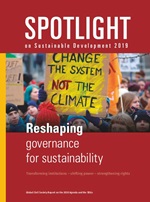Published on Fri, 2019-09-20 10:34
Will world leaders at the Climate Summit match the courage of the school students who strike around the world against the climate emergency, or will they be put to shame? 20 September, New York: Will the tone of Monday’s UN Climate Summit pale in contrast with the courage of striking students who are taking a day off school in 120 countries, to march for action to confront the climate emergency, though many know they could face severe penalties? |
Published on Wed, 2019-09-18 21:03
With the focus firmly on preparations for the UN General Assembly (UNGA) High-Level Week (23-27 September), the Presidents of the General Assembly (PGAs) and the UN Secretary-General expressed their concerns and ambitions in closing the 73rd Session and opening the 74th Session. While the UNGA High-Level Week will feature high-level meetings on climate, universal health coverage, financing for development, the Sustainable Development Goals (SDGs), and solutions for Small Island Developing States (SIDS), the UNGA’s remit goes far beyond that week, with meetings spanning the entire year, and a new session beginning each September. |
Published on Mon, 2019-09-16 12:09
The 2030 Agenda for Sustainable Development clearly identifies several issues, ranging from finances, to climate to trade, where global governance agreement is required. But actual decisions on these issues often run in the opposite direction. Non-accountable ‘clubs’ exercise de facto authority and raise obstacles to implementing the SDGs. While leaders of all UN Member States decided on a transformative agenda for 2030, a de facto form of global governance, sometimes called ‘shadow governance’, works in the opposite direction. Operating in opposition to global norms as self-selected ’coalitions of the willing’ or in the interstices of national sovereignties-such as the global ‘shadow banking’ where illegal financial flows meet established financial arrangements- these major obstacles to achieving the SDGs are not loose trends or wild forces beyond control, but rather the result of a secretive but efficient network of governance ‘clubs’ that operate beyond public scrutiny or parliamentary oversight, the two accountability mechanisms identified in the 2030 Agenda. |
Published on Mon, 2019-09-16 12:00
Climate change is increasingly making its impact felt worldwide. Everyone is suffering, but the poor in the developing world is bearing the brunt of the impacts. It is not fair that those who did not contribute to the problem of climate change are suffering the most, and sometimes even paying with their lives. The developed world, historically responsible for causing climate change must own responsibility and fulfil longstanding commitments to reduce emissions and provide developing countries the means—finance, technology, capacity building—to deal with climate change. Under the Paris Agreement on climate change countries agreed to climate action via nationally determined contributions (NDCs). Developed countries have been mandated to help developing countries with the means to achieve their climate goals. However, they have reneged on their commitments time and again. This cannot continue. |
Published on Mon, 2019-09-16 11:23
Arab NGO Network for Development (ANND) hosts an electronic platform to share information and reports on the progress in the implementation of the Agenda 2030 for Sustainable Development issued by CSOs in the Arab Region. |
SUSCRIBE TO OUR NEWSLETTER






